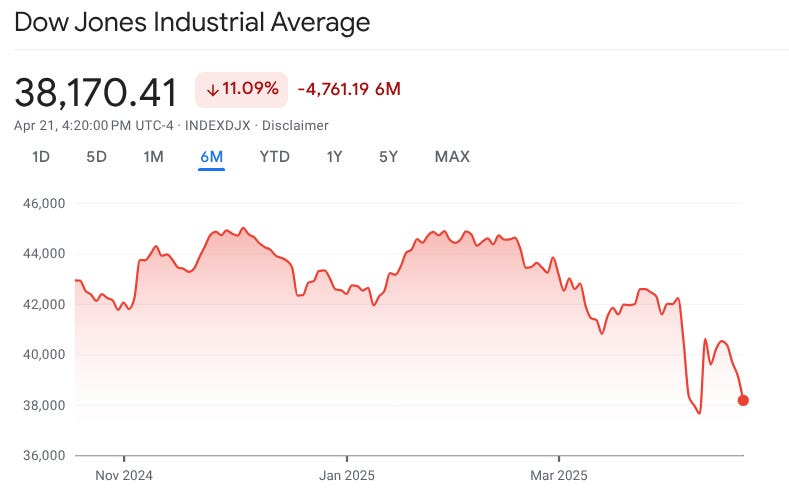So Much Winning
It's amazing how much winning we've been doing.
Good Evening:
America, Fuck Yeah!
The New York Times today has a bumper crop of dumb headline questions:
Constantly. Do it over and over and over again. And then do it again, just to make sure.
Yes.
It depends if the disability prevents them from playing pickleball. Is she blind?Is she armless and can’t swing a paddle? Or are you just being an asshole?
Nope.
Pretty damn secure, but that doesn’t mean your device is secure. So don’t use it for sharing attack plans, okay?
In a conclave.
A guy named Kevin.
Today on #DogShirtTV, the estimable Alicia Wanless and I welcomed the estimable Michael Sean Winters, a Catholic journalist and author, to discuss the death of Pope Francis and the future of the Catholic Church:
Today On Lawfare
Compiled by the estimable Caroline Cornett
The Counterproductive Legal Precedent That Strikes on Cartels Would Set
J. Luis Rodriguez argues that the United States should refrain from invoking the “unwilling or unable doctrine” of self defense—which Mexico has argued contradicts established international law—to justify use of military force against Mexican cartels. Rodriguez warns that a broad application of the doctrine could encourage other countries to attack non-state actors and adversaries despite lacking strong justifications:
According to the Mexican government’s position, the unwilling or unable doctrine contradicts established international law and multilateral practices. While most countries have either not established their view or have an ambiguous opinion about this doctrine, a vocal minority of countries have proposed a restrictive interpretation. Those opposed to the expansive view promoted by the United States and others argue that states that feel threatened by non-state actors should seek collective and multilateral responses following established procedures under international law. These countries do so out of an interest in ordering international politics, not just as a principled defense of the law.
Europe’s Undersea Opportunity
In the latest installment of Lawfare’s Foreign Policy Essay series, Sophia Besch and Erik Brown emphasize the growing importance of undersea cables and other forms of subsea infrastructure to European states. Besch and Brown discuss strategies for improving deterrence, repair, and resilience capabilities, including asserting legal authority to arrest vessels beyond territorial waters, increasing the number of repair vessels, and eliminating redundancies in funding:
First, Europeans should lead a global push to update inadequate domestic legal regimes and reinterpret international maritime law to protect against damage to subsea infrastructure. Second, European countries should create new partnerships with industry leaders to expand global cable repair capabilities, upending the current market-driven model. Third, the European Union should leverage its position to help expand trusted subsea networks to countries wary of picking sides in the broader U.S.-China technological competition. This dynamic will become increasingly important as U.S. tech moguls position themselves closer and closer to a Trump administration openly hostile toward Europe and Europeans increasingly lose trust in the firms that provide digital services and their underlying infrastructure.
How Civil Litigation Can Hold Hate Groups Accountable
Luke Baumgartner discusses how civil rights groups can use the legal framework of the Ku Klux Klan Act of 1871 to challenge hate groups in court, highlighting that the potential resulting financial penalties of this litigation are an effective tool at a time when the Department of Justice has signaled that prosecution of these groups is no longer a priority:
The continued use of civil lawsuits aimed at dismantling hate groups underscores the enduring relevance of legal tools like the Ku Klux Klan Act to combat racial violence and extremist intimidation campaigns. While criminal prosecutions of far-right extremist groups may wane in the coming years due to political leadership, civil litigation remains a potent avenue for holding these groups and individuals accountable and, in some cases, forcing their dissolution through financial penalties.
Podcasts
On Lawfare Daily, I sit down with Anna Bower, Quinta Jurecic, Roger Parloff and James Pearce to discuss the status of the civil litigation against President Donald Trump’s executive actions, including Judge James Boasberg's finding of probable cause for contempt in the Alien Enemies Act case:
Today’s #BeastOfTheDay is the seal, seen here in several different iterations. First, the seal talking with its mouth full:
Next, the seal engaged in disputation:
And finally, the seal at a doctor’s appointment:
In honor of today’s Beast, gargle, slap your friend, and give hugs.
In Honor of Pope Francis
I (EJ Wittes) have my differences with Pope Francis—and he no doubt with me. (That time he called me a nuclear weapon comes to mind.) That said, I do agree with Michael Sean Winters’s fundamental analysis of his legacy as an attempt to push the Catholic Church towards the poverty and humility embodied by St. Francis of Assisi.
Therefore, in honor of Pope Francis’s passing, I present my favorite story of the life of St. Francis.
Keep reading with a 7-day free trial
Subscribe to Dog Shirt Daily to keep reading this post and get 7 days of free access to the full post archives.












